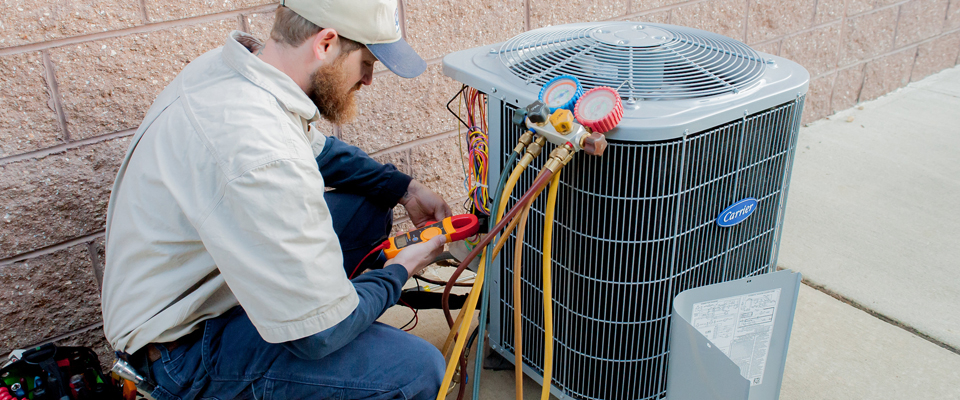Keep Your HVAC System Optimal with Help from DMAKS HVAC.
Keep Your HVAC System Optimal with Help from DMAKS HVAC.
Blog Article
Energy-Efficient Cooling And Heating Solutions to Minimize Energy Costs
As energy prices continue to increase, the significance of energy-efficient A/c systems ends up being increasingly noticeable. These systems not just promise considerable savings on energy bills yet also add to a much more sustainable future by reducing energy usage.
Advantages of Energy-Efficient A/c Systems
Energy-efficient cooling and heating systems offer numerous benefits that expand beyond mere expense financial savings. One significant advantage is the minimized environmental influence. By eating much less energy, these systems contribute to lower greenhouse gas exhausts, assisting to combat climate adjustment and promote sustainability. This lines up with raising societal demands for eco-friendly techniques in domestic and industrial setups.
Furthermore, energy-efficient cooling and heating systems frequently supply improved comfort levels. A lot of these systems include sophisticated modern technology that enables for far better temperature level control and boosted air top quality (DMAKS HVAC). This brings about a much healthier indoor atmosphere, which is especially crucial for individuals with allergies or breathing problems
Moreover, spending in energy-efficient a/c systems can improve residential property worth. As even more consumers prioritize power effectiveness, homes and buildings geared up with these systems may bring in greater bids in the property market.
Sorts Of Energy-Efficient Cooling And Heating Options
Just how can house owners and businesses pick one of the most appropriate energy-efficient a/c options for their needs? The market offers a variety of energy-efficient a/c systems, each created to improve comfort while minimizing power usage.
One option is the variable cooling agent flow (VRF) system, which efficiently manages the temperature in numerous zones within a structure. This system adapts its refrigerant circulation to match the desired temperature level, resulting in significant power savings.
An additional prominent choice is geothermal heatpump, which use the planet's steady temperature level to warm and cool areas. By transferring warm to and from the ground, these systems demonstrate excellent efficiency, especially in moderate climates.
In addition, ductless mini-split systems offer an energy-efficient choice for homes lacking ductwork. These systems enable for zone-specific home heating and cooling, lowering energy waste in vacant locations.
Lastly, high-efficiency heaters and ac unit, with advanced SEER and AFUE scores, supply reputable environment control while consuming less energy than typical models. By assessing these alternatives, homeowners and companies can choose a HVAC system tailored to their particular requirements and power performance goals.
Secret Functions to Take Into Consideration

Following, examine the kind of compressor utilized in the system. DMAKS HVAC. Variable-speed compressors can adjust their outcome to match the home heating or cooling need, resulting in boosted comfort and power cost savings contrasted to single-speed models. In addition, search for systems outfitted with smart thermostats that use programmable setups and remote gain access to, permitting much better control over power consumption
An additional essential attribute is the system's air filtration capability. High-efficiency filters can improve interior air top quality and lower power intake by making certain the system runs successfully. In addition, take into consideration the kind of cooling agent made use of; contemporary systems typically utilize environment-friendly cooling agents that have a lower environmental impact.
Last but not least, make sure that the system is compatible with zoning innovation, which enables tailored temperature control in various locations of your home, boosting convenience while minimizing energy usage.
Tips for Picking the Right System


Following, think about energy efficiency rankings, especially the Seasonal Energy Efficiency Proportion (SEER) for cooling systems and the Annual Gas Use Effectiveness (AFUE) for furnace. Greater scores indicate better effectiveness, which can result in substantial financial savings on utility costs gradually.
Additionally, review the kind of heating and read this cooling system that best fits your lifestyle and spending plan. Choices include air conditioning, ductless mini-splits, and heat pumps, each with its very own set of benefits and disadvantages.
Do not neglect the importance of appropriate installation and sizing; an inaccurately sized system can result in inadequacies and enhanced wear. Consult with an expert HVAC specialist to obtain skilled referrals tailored to your home's special needs. This extensive technique will certainly guarantee that you choose an energy-efficient cooling and heating system that meets your requirements and spending plan properly.
Upkeep for Optimal Effectiveness
When the appropriate heating and cooling system is in location, recurring upkeep becomes essential to making sure optimum efficiency and longevity. A well-kept system operates a lot more properly, causing reduced energy consumption and decreased utility expenses. Routine assessments and tune-ups must be set up a minimum of two times a year-- as soon as prior to the air conditioning period and as soon as prior to the home heating period.

Home owners must also be attentive about checking their heating and cooling system's efficiency. Unusual noises, rising and fall temperatures, or raised energy bills can indicate underlying concerns that need instant interest. By dealing with these issues promptly, home owners can protect click over here against pricey fixings and extend the life-span of their systems.
Investing in a maintenance strategy with a certified service technician not just enhances performance yet also provides assurance, understanding that the system is running at its ideal. DMAKS HVAC. Normal maintenance is consequently essential for sustaining power efficiency and minimizing overall operational expenses
Final Thought
Finally, energy-efficient heating and cooling systems offer a practical remedy for minimizing utility costs while improving convenience and air quality. By integrating innovative innovations and alternatives such as geothermal heatpump and ductless mini-splits, homeowner can achieve significant power cost savings and add to ecological sustainability. Mindful factor to consider of system attributes and continuous maintenance even more ensures ideal performance, making energy-efficient systems a prudent investment for both economic and ecological advantages.
Report this page